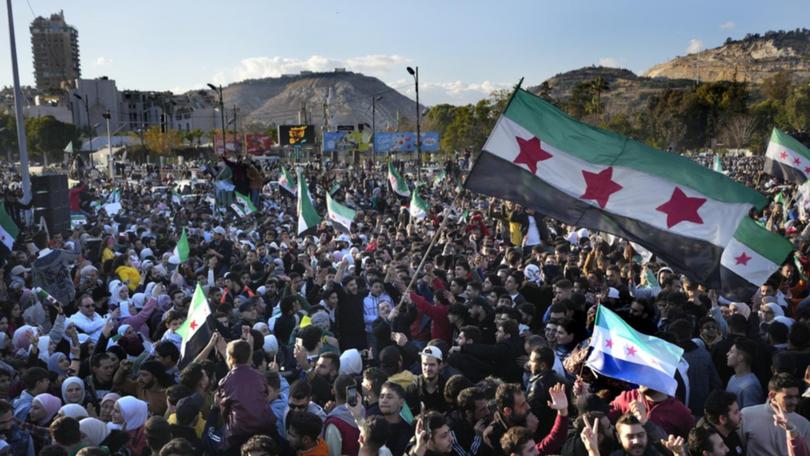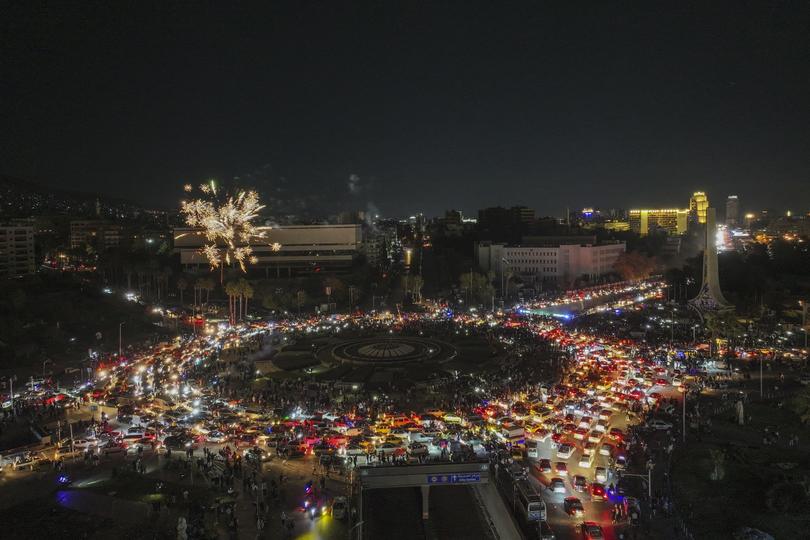Syria: Thousands celebrate in Damascus after first ‘free’ Friday prayers following Bashar al-Assad fall
Thousands of Syrians have gathered at a square in the capital Damascus to celebrate after the first Friday prayers following Bashar al-Assad's ousting.

Ten of thousands of Syrians have been celebrating after the first Friday prayers since the fall of Syrian ruler Bashar al-Assad.
The lightning victory by an opposition rebel alliance, which took control of Damascus last weekend, ended more than 53 years of rule by the al-Assad family.
Clapping, raising victory signs and waving flags of the Syrian opposition, people in major squares across the country on Friday chanted “God bless Free Syria”.
Sign up to The Nightly's newsletters.
Get the first look at the digital newspaper, curated daily stories and breaking headlines delivered to your inbox.
By continuing you agree to our Terms and Privacy Policy.“Raise your head up high you are a free Syrian now,” said the crowds who gathered after the traditional weekly prayers.
According to eyewitnesses, tens of thousands of people gathered at the Umayyad Mosque in Damascus alone.
“All the doors were open for the first time to allow everyone to do Friday prayers inside the mosque,” a resident of the capital told the DPA news agency.
The leader of the Islamist insurgency alliance Ahmed al-Sharaa - still widely known by his nom-de-guerre Abu Mohammed al-Golani - earlier called on Syrians to celebrate peacefully.
“Celebrate without firing celebratory gunfire and do not terrify people,” Mr al-Sharaa said in a video message where he was dressed with a white shirt, rather than his previous military fatigues.

Eyewitnesses in various cities told DPA that strict security measures were being taken to monitor the celebrations.
“Public security will deal firmly with anyone proven to be involved in shooting during the celebration,” a statement from the Syrian opposition groups said.
“We call for adherence to peaceful behaviour during demonstrations to preserve everyone’s safety,” the statement added.
Khaled al-Imam, a resident of the Daraya suburb of Damascus, said he was going out “to celebrate the victory over the regime of Bashar al-Assad, who killed two of my brothers and more than 15 of my family members”.
Until his ouster, al-Assad had been in power in Syria for 24 years and had fought a brutal civil war against rebel groups for more than 13 years.
The war seemed to have been at a stalemate, with the rebels beaten back in most areas, until a lightning offensive spearheaded by jihadist groups at the end of November revealed that the government’s hold on power was far weaker than many thought.
Al-Sharaa’s force, Hayat Tahrir al-Sham, and its allied insurgents have been working to establish security and start a political transition after seizing the capital early on Sunday.
At the same time, they have tried to reassure a public that is both stunned by the fall of the state that had long ruled with an iron hand and concerned over extremist jihadis among the insurgents.
The Friday prayers have a particular symbolism because in the early days of the anti-government uprising turned civil war in Syria in 2011, protesters would turn out en masse after going to the mosque.
“Unified Syria to build Syria,” the crowd gathered in Damascus’ Umayyad Square chanted.
Some shouted slurs about the former president and his late father, calling them pigs, an insult that would have previously led to offenders being hauled off to one of the feared detention centres of Assad’s security forces.
As the gathering took place, the top US diplomat was in the region discussing the United States view on the developments in Syria with regional powers.
In the Turkish capital Ankara, US Secretary of State Antony Blinken said there was “broad agreement” between Turkey and the United States on what they would like to see in Syria.
That starts with an “interim government in Syria, one that is inclusive and non-sectarian and one that protects the rights of minorities and women” and does not “pose any kind of threat to any of Syria’s neighbours,” Mr Blinken said during joint statements with Turkey’s Foreign Minister Hakan Fidan.
The insurgent groups that toppled Assad in Syria have not made clear their policy or stance on Israel, whose military in recent days has bombed sites all over the country.
Israel says it is trying to prevent weapons from falling into extremist hands and has seized a swath of southern Syria along the border with the Israeli-occupied Golan Heights, calling it a buffer zone.
with AP
